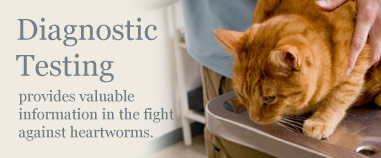Diagnostic Tests: Tools for the Prevention and Treatment of Heartworm Disease in Cats

Heartworm disease should be taken seriously. This is especially true for cats since they are not natural hosts for these worms so when they get infected the symptoms are unpredictable and confusing. Likewise, these worms do not only invade the cat's heart but also other areas like body cavities, arteries, the brain and the spinal cord. The bad news is that there are currently no satisfactory heartworm treatments for cats. This is because the medications that kill heartworms may prove dangerous to them because the cat's body does not react well to dead heartworms.
But all hope is not lost for these felines and cat owners need not wait for their cats to show any symptoms. There are now diagnostic tests available that may help determine if the cat has heartworm disease so it can be dealt with immediately .
Thoracic Radiography or X-rays.
This test will show if the cat's main pulmonary artery is enlarged, or weakened and twisted. This condition is caused by larvae in the fifth stage level (L5). Vets use this test to confirm a diagnosis and to develop a prognosis.
Echocardiography or ultrasound readings of the heart
This is a test that uses sound readings to visualize areas inside the body. It can show if heartworms are in the heart, the main pulmonary artery or in any of its immediate branches. Although this test has its limitations - like not getting readings from the branches of the pulmonary arteries where young worms are found in cats - it can confirm the presence of heartworms in the body.
CBC or complete blood count
This can detect if there is heartworm infection when the cat exhibits anemia, nucleated erythrocytes (immature red blood cells), eosinophilia (increased number of eosinophils, a type of white blood cell) and basophilia (increased number of basophils, a type of white blood cell). With this test, the strongest indicator of heartworm disease is the presence of a large number of basophils.
Serologic testing
This can determine the presence of larvae in the fifth stage level (L5) and adult worms, both of which cause heartworm disease in cats. The combined use of antibody and antigen tests are effective methods that can help both veterinarians and pet owners determine the appropriate preventive steps to take.
1. Antigen Tests
These tests can indicate an infection by detecting particular antigens that are present in adult female heartworms that are at least seven or eight months old. Most tests of this kind are used for dogs but there are several that are approved for cats and are available in clinics. These tests may not be able to detect the presence of a majority of heartworms (Immature and male worms) but they are reliable when it comes to determining the presence of female heartworms.
2. Antibody Tests
These tests detect antibodies produced by the cat in response to the presence of heartworm larvae. They could detect infections as early as 8 weeks after a mosquito has transferred the larvae into the cat's body. Test results can be improved through the use of genetically engineered heartworm antigen.
Inspite of their limitations, diagnostic testing for heartworms for cats is "good medical practice" as recommended by the
American Heartworm Society (AHS). These tests not only alert us of the presence of heartworms but they also tell us when to begin taking preventive measures to stop the increase in the number of heartworms and to control the symptoms. There are many ways to protect our cats and one of the most effective means against these parasites is to use these FDA-approved heartworm preventive products for cats like
Interceptor® (Milbemycin oxime, orally) and
Revolution® (Selemectin, topically).
Now, which test are you going to use on your cat?

